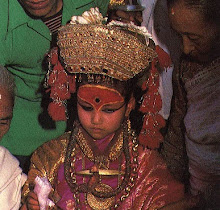This "Teej" is a small red insect that comes out of the soil during rains. Teej is a fasting festival of women in Nepal that falls on month of Shravan (August). The celebration of this festival is for marital bliss, well being of spouse and children and purification of own body and soul.
Traditionally, the ritual of Teej is obligatory for all Hindu married women and girls who have reached puberty. According to the holy books, the Goddess Parbati fasted and prayed fervently for the great Lord Shiva to become her spouse. Touched by her devotion, he took her for his wife. Since then, Hindu women started to celebrate this festival.
The festival is celebrated for three-days. The first day of Teej is called the "Dar Khane Din". On this day the women, both married and unmarried, assemble at one place and start dancing and singing devotional songs on till
The third day of the festival is Rishi Panchami. Women perform final ritual of Teej paying homage to various deities and bathe with red mud found on the roots of the sacred datiwan bush, along with its leaves. After it, women are considered absolved from all sins.
References:
